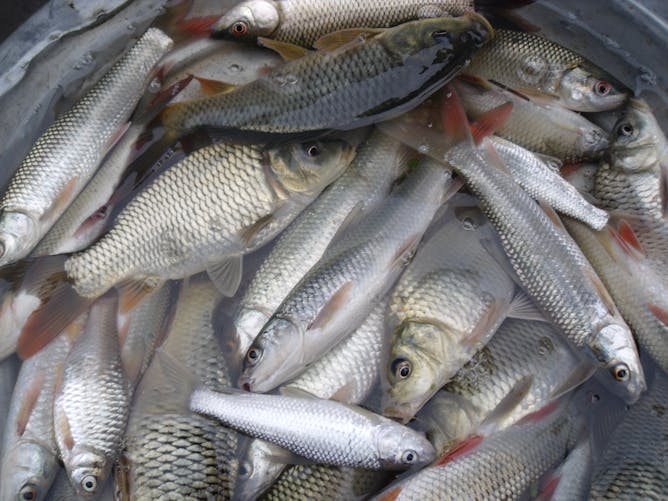|
Fish farming has a spotty reputation among many western social scientists and development advocates, who view it as mainly producing high-value species like shrimp for export to wealthy nations. But three experts’ new research finds that in fact, aquaculture is an increasingly important food source in the global south. They explain that the vast majority of farmed fish is consumed in the developing countries where it's grown – and that it's widely accessible to poorer consumers.
In other stories, our authors investigate the global impact of China’s abolition of presidential term limits, the uses and abuses of the term “radicalisation”, and the wild leopards who keep Mumbai’s stray dogs in check.
|

Farmed fish like these carp now make an important contribution to global food security.
Ben Belton
Ben Belton, Michigan State University; Dave Little, University of Stirling; Simon Bush, Wageningen University
Many critics say that fish farms mainly sell their output to wealthy countries and don't provide much benefit to poor people in producing countries. Three aquaculture experts show why this view is wrong.
|
Health + Medicine
|
-
Bibha Simkhada, Liverpool John Moores University; Edwin van Teijlingen, Bournemouth University
Pregnant women and new mothers who feel totally powerless are taking their own lives in increasing numbers in Nepal. More mental health training for local midwives is needed.
|
|
Business + Economy
|
-
Ben Cousins, University of the Western Cape
South Africa's land policy is flailing around in the dark, with the haziest of understandings of how well or how badly land reform is doing.
|
|
Politics + Society
|
-
David E Kiwuwa, Princeton University
The Chinese Communist Party's decision to remove the country's presidential term limits could be a signal to African despots that incumbents can hold on to executive power indefinitely.
-
Merike Blofield, University of Miami; Christina Ewig, University of Minnesota; Jennifer M. Piscopo, Occidental College
New research on Latin America's four recent female presidents disproves the idea that merely putting a woman in power will improve gender equality.
-
Rob Faure Walker, UCL
The word only appears 14 times in the UK's parliamentary record between 1803 and 2005. Now it is everywhere.
|
|
Environment + Energy
|
-
Christopher O'Bryan, The University of Queensland; Alexander Richard Braczkowski, The University of Queensland
Wild leopards that live in an Indian city park like to dine on stray dogs, which new research says may help reduce the number of potentially deadly dog bites on people.
|
|